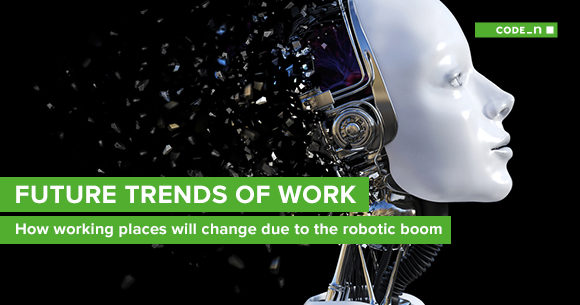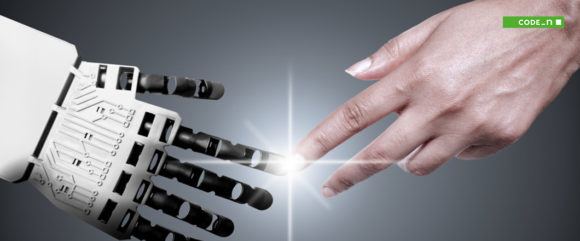The future trends of work for companies: how working places will change due to the robotic boom
For a long time, it has been the topic of sci-fi thrillers – now, it’s becoming reality: the robotics revolution. No panic needed though, it looks very different to the way film directors envisioned it. Mechanical men don’t march among us, in fact robots are mainly used in the industry. So, what exactly does the future hold for us? What’s hot in robotics? And most importantly: how are working places going to change in course of the robotic boom? CODE_n got some answers for you and names 3 trends to keep an eye on.

The future trends of work for companies #1: human robot collaboration
Improved productivity combined with high cost efficiency: that’s what a well-designed human robot collaboration has to offer. Sounds promising, right? The concept provides empowered employees with robotic tools – also called co-bots. Nowadays, collaborative robots represent 5% of the overall robot market but there are strong growth expectations for the future. Insiders suggest a more rapid growth: collaborative light robots becoming the top-seller in the industry in about 2 years, selling hundreds of thousands of them and prices falling to the $10,000 price point.

The future trends of work for companies #2: robot colleagues
Ordering your coffee using a self-serve computer screen instead of actually speaking to a human behind a counter is one of the most obvious examples of how workplaces are becoming more and more automated. A survey conducted by McKinsey Global Institute predicts that half of the work activities performed by humans today will be automated in 40 years. So, this trend is not focusing on a helping hand through robotic tools but on a replacement. Though it needs to be mentioned that whether human employees can be replaced by robots depends a lot on the type of job.
The future trends of work for companies #3: working anywhere
Nowadays, working from home is not a revolutionary idea anymore although it implies an improved level of connectivity. But future employees will have more control over their schedule. According to Alain Dehaze, CEO of Adecco Group, a new work-life balance implies a job which is “no longer confined to traditional working hours or places, with employees taking total control over their schedules and environments”. To him, in an improving digital world, mobility in the workplace needs to be redefined, since it no longer only affects traditional expatriate placements, but moving jobs to where talented people are located.
Now you got some first insights on how working places will change in course of the robotic boom. In case you are interested in how our Alumni are driving digitalization forward, take a look at the CODE_n Alumni section.





Comments